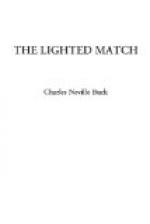Through a shaded courtyard where a small fountain tinkled, Blanco strolled to the Consular office and rapped on the door. He was conducted by a native servant to an inner room. Here, while a great blue-bottle fly droned and thumped, Reebeler, a heavy Briton with mild eyes, sprawled his length in a wicker chair and poured brandy and soda. First Blanco represented himself as an adoptive American, touring the world and interested in natural resources. When his host had exhausted the subject of the wine-grower’s battle against the ravages of “oidium Tuckeri” and “phyloxera,” Blanco picked up a stick of sealing-wax from the table and commenced toying with it in a manner of aimlessness. He struck match after match and melted pellet after pellet of wax, then absently he took from his pocket a gold seal-ring and made, with its shield, several impressions on the wax. Reebeler’s eyes were half-closed as he gazed vacantly at the pigeons cooing and strutting in his courtyard.
“See, I have at last got a good impression.” The Spaniard idly tossed over the scrap of paper upon which he had stamped a half-dozen of Louis Delgado’s crests from the die of the Comptessa Astaride’s ring.
The Consul took the fragment of paper with the manner of one forced by politeness to assume an interest in trivialities which bore him.
“See how clearly the device of His Grace stands out in the last impression,” casually suggested Blanco, then with eyes narrowly bent on the other he saw the astonished start as his vis-a-vis realized what device had been imprinted on the paper. It was the sign for which he had played. When Reebeler’s eyes came up questioningly to his own, he, too, was looking off through the raised window where the limp curtain barely trembled in the light breeze.
“The ring is interesting,” suggested the Consul.




